With funding support from the Aspen Network of Development Entrepreneurs (ANDE) at the Aspen Institute and Canada’s International Development Research Centre (IDRC), WDI is working with Gente del Futuro (GDF)– a for-profit partnership between three private players within the coffee sector. Together, GDF and WDI are working to collect empowerment data from women working with GDF in Colombia. GDF believes that making coffee more profitable and empowering young people, particularly women, through practical and technical training can promote a more inclusive approach to develop better functioning coffee chains.
To help accomplish this objective, WDI is supporting GDF to pretest and pilot a short quantitative survey that examines how empowerment differs based on women’s role in the coffee value chain. The data will be used to use to inform GDFs operations, in particular how they can better engage and empower women. The survey will be administered to a sub-sample of the 300-500 women that GDF has worked with over the years in Colombia and will assess decision-making and empowerment at home and work.
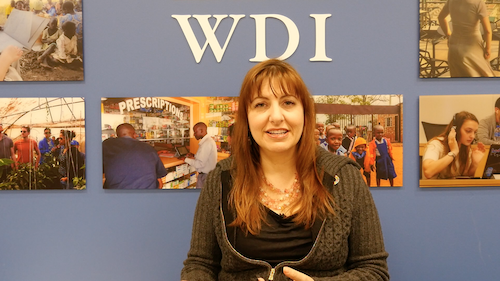
It’s a new era when it comes to cooperation between some of the world’s largest corporations, governments and nonprofit organizations working together to address some of the most pressing social and environmental challenges.
So argued Tami Kesselman, an expert in impact investing and WDI’s Global Impact Speaker in January. Kesselman followed her University of Michigan campus discussion with a video interview at WDI’s offices.
Kesselman, the founder of Aligned Investing Global, works at the intersection of corporate, government, entrepreneurial and investor communities. Among the topics Kesselman addressed in the video include:
Kesselman’s WDI talk to U-M students gave them a behind-the-scenes look at how the business, government, philanthropic and investing communities overcame years of mistrust and misaligned priorities to begin a shift toward collaborative investments. She also discussed whether this large-scale, multi-sector collaboration in every part of the world is here to stay. And she also shared why she thinks businesses should consider the Sustainable Development Goals as a whole, rather than focus on individual ones.
Kesselman earned her bachelor’s degree in Industrial Relations at the University of Michigan with a triple minor in business, economics, and communications. She then went on to earn her Master of Public Administration degree at Harvard Kennedy School, with a dual concentration in business and government.
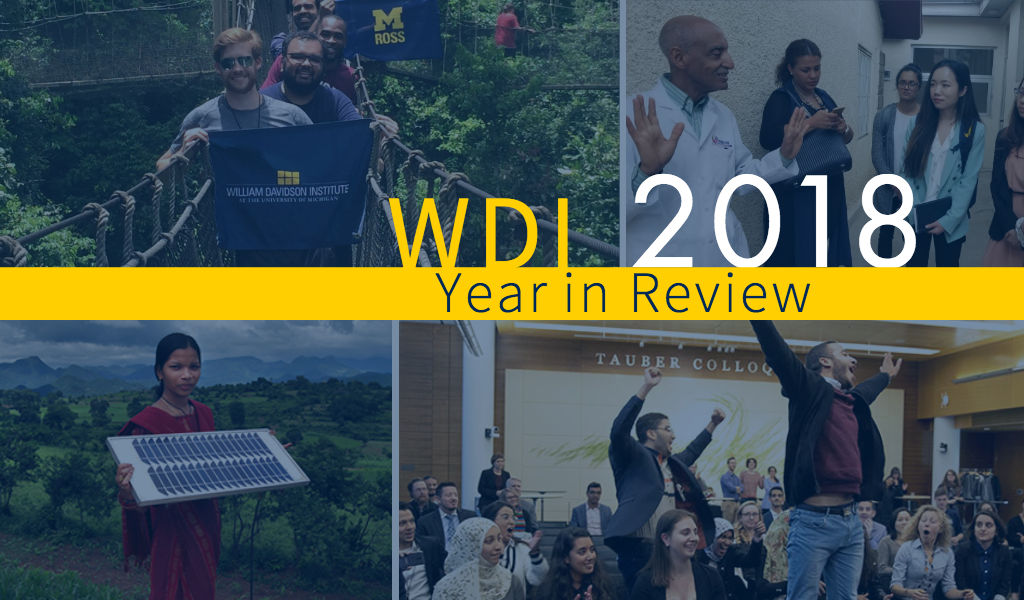
Improving reproductive health supply chains to boost access to family planning products in Mozambique. Educating senior managers from around the Baltics. Helping both investors and enterprises they support better measure impact in Latin America. Creating new MBA-level curriculum for universities in Papua New Guinea.
These partner projects are just a few examples of the work WDI performed around the world in 2018. Working with a robust set of private sector and nonprofit partners on a diverse number of projects, WDI effectively applied business skills in low- and middle-income countries (LMICs) in impactful ways.
In all, WDI teams worked on more than 40 projects with more than 40 partners in more than 40 countries this past year that focused on our core consulting sectors—education, energy, finance and healthcare, as well as our management education programs, entrepreneurship development, measurement and evaluation services and the deployment of University of Michigan graduate students around the world.
“In 2018, I was impressed by the degree to which the Institute integrated the energy and talents of our staff, University of Michigan students and faculty leaders to address multiple challenges facing for-profit and non-profit organizations,” said WDI President Paul Clyde. “While most of these projects were in one of our key focus areas—Energy, Healthcare, Management education or Finance—many drew on expertise that cut across sectors or disciplines to deliver more complete solutions.”
WDI’s project work leveraged the knowledge and expertise of the Institute’s staff, its research fellows and faculty from the University of Michigan and other world-class higher education institutions to develop business solutions in LMICs. Additionally, WDI disseminated what it learned doing work in the field through published research reports, academic journal articles and notable blog posts. The Institute also contributed to U-M student and faculty enrichment by hosting several compelling speakers at the Ann Arbor campus.

Members of the LIFE project consortium visit a produce stand in Turkey and interviews the owner on how a green grocer sources his produce and his perspective on how he could potentially benefit from the LIFE Food Enterprise Center.
Our work in 2018 spanned the globe and included projects on a wide variety of topics and issues. Among the work, WDI launched a new consulting focus area in the energy sector, connected hundreds of students using virtual technology, developed a model to train nurses for a planned hospital in Ethiopia and trained refugees in the food industry in Turkey. Here are a few highlights from our project work this past year.
Throughout the past year, WDI has widely shared its research and field work a to a broader audience through a number of publications and online journals.
“Participating in the project to test the framework provided us a holistic understanding of poverty. WDI gave us the tools to guide decision-making and track progress towards broader development goals through data collection and analysis.”
—Mónica Varela, director of impact for the Clinton Giustra Enterprise Partnership
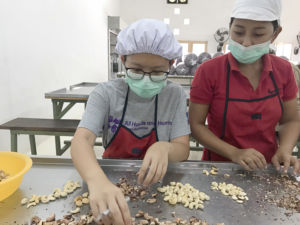
WDI intern Nadia Putri (pictured left)
A number of WDI employees penned blogs on their work or trends impacting their research that appeared on the Institute’s website.
In 2018, WDI hosted speakers as part of the the Institute’s Global Impact Speaker Series. While on campus, many of the speakers sat down for one-on-one interviews.
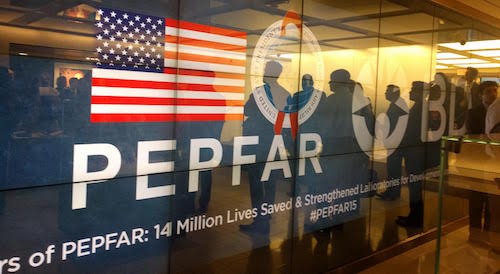
WDI has been commissioned by Becton, Dickinson and Company (BD), one of the largest global medical technology companies in the world, to be a monitoring and evaluation partner for their BD-PEPFAR public-private partnership with the U.S. State Department’s Office of the Global AIDS Coordinator (OGAC) and the U.S. Centers of Disease Control and Prevention (CDC). The U.S. President’s Emergency Plan for AIDS Relief (PEPFAR) is the largest commitment by any nation to combat a single disease in history.
As part of this work, Heather Esper, WDI’s senior program manager for the Performance Measurement Initiative (PMI), was invited to participate in a series of meetings with partners working on two BD-PEPFAR programs – Labs for Life and Infection Prevention and Control.
PMI, along with WDI’s Healthcare Initiative, is developing and will conduct an assessment of Phase 3 of the third Labs for Life partnership. The Institute will explore the impact and cost effectiveness of the Labs for Life activities, including laboratory system strengthening for improving quality management practices and fortifying specimen referral systems for HIV and TB.
WDI also conducted a retrospective assessment of the impact of selected activities for Phase 2 of Labs for Life. This work included a quantitative and qualitative analysis of a Kenya lab’s accreditation, and a quantitative assessment of the Kenyan National Public Health Laboratory Center of Excellence for Equipment Calibration, Certification and Training, which was set up and initiated by BD in partnership with the Ministry of Health. Esper and Pascale Leroueil, vice president of WDI’s Healthcare Initiative, presented the findings in April 2018 at the Labs for Life Phase 3 kickoff in London.
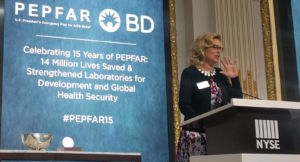
Deborah Birx, Ambassador-at-Large, U.S. Global AIDS Coordinator & U.S. Special Representative for Global Health Diplomacy
Also in conjunction with PEPFAR and BD, OGAC and the CDC, the Institute is working to design and implement an assessment of the impact of a new program, Infection Prevention and Control, in Kenya. The goal of the program is to strengthen health worker and patient safety through appropriate safe intravenous infusion therapy practices, leveraging BD’s longstanding knowledge and safety-engineered technology for averting HIV, hepatitis and other blood-borne pathogen transmission.
Esper said WDI is proud to be developing and implementing strong monitoring and evaluation systems on two PEPFAR public-private partnerships with BD, the Office of the Global AIDS Coordinator and the Centers for Disease Control and Prevention focused on the prevention and diagnosis of HIV/AIDS.
“Both of these monitoring, evaluation, research and learning (MERL) systems have a large focus on cost-effectiveness and will help inform activities that should be scaled to help meet the UNAIDS’ treatment goals and beyond,” she said. “These systems also allow partners to track activities as they are implemented with the goal of delivering more impact.”
As part of this work, on July 11 Esper and WDI Healthcare Research Associate Erika Beidelman, traveled to New York for two working meetings related to the monitoring and evaluation design of both PEPFAR programs.
That same morning, BD, PEPFAR and other BD guests rang the NYSE Opening Bell to celebrate a decade of partnerships to address HIV/AIDS as well as to recognize PEPFAR’s 15 year anniversary, which has impacted 14 million men, women, and children with HIV & AIDS globally. Deborah Birx, Ambassador-at-Large, U.S. Global AIDS Coordinator & U.S. Special Representative for Global Health Diplomacy, Office of Global AIDS Coordinator, was recognized by BD for her leadership.
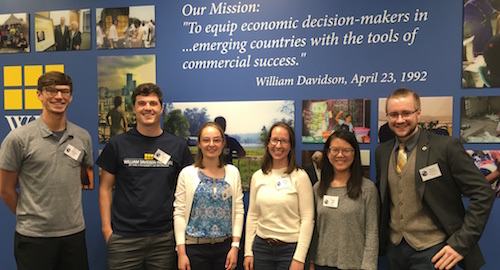
WDI’s 2018 summer interns before they set off on their voyages.
Over the years, WDI’s summer interns have faced unique challenges as they have conducted their work across the globe for the Institute and its partners. Impassable roads, extreme weather, the occasional wild animal. An active volcano can now be added to the list.
WDI intern Nadia Putri spent her summer in Bali, Indonesia working with East Bali Cashews on quality improvement projects, measuring the company’s impact on women and developing a U.S. market entry strategy. She also got an up close look at emergency preparedness.
“It was really beautiful, but a bit scary at the same time for someone who has never seen anything like it before,” she wrote of watching the sparks of lava and plume of smoke rise from the crater near where she was working. The cashew factory was outside the evacuation zone but management kept a daily eye on the volcano in case conditions changed. Earthquakes in the region have claimed nearly 400 lives during August.
Putri was one of six WDI interns working internationally this summer. Some, like Putri, have returned to the University of Michigan campus; others are finishing up their work and will be back in Ann Arbor soon. While overseas, the interns contributed to a blog to chronicle not only their work but also the experience of living in a foreign land. WDI has highlighted some of the work below and the full blog chronicling interns’ experiences is available here.
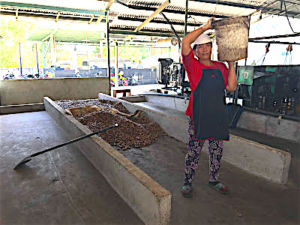
East Bali Cashews where Putri worked sources sustainably grown cashews from nearby smallholder farmers and processes them in a factory located in a remote village in one of Bali’s poorest regions. Since its launch in 2012, the company has integrated various social missions in and around its cashew processing operations, including community improvement and women’s empowerment.
Putri, a Ross School of Business MBA candidate, said factory workers were very supportive of her work and willing to explain how the company has impacted them. One employee recalled being hired after graduating from high school and is now in charge of 50 workers.
“At the factory, everyone is very welcoming and open to share their stories,” Putri wrote in her blog. “It’s especially humbling to see such high curiosity and willingness to learn from the factory employees. This serves as my daily reminder that (the) situation you grew up or lived in does not define who you could be.”
In Kenya, Andrea Arathoon, a School of Public Health graduate student, was tasked with helping a local maternity hospital reduce costs and increase patient volumes to achieve sustainability while also maintaining quality. One intervention Arathoon worked on for Jacaranda Maternity is a new outpatient care checklist for prenatal visits.
 The checklist is designed to improve patient processing within the outpatient clinic. This improved flow will reduce wait times and result in more efficient consultations, thus increasing patient volume and reducing costs, Arathoon wrote. She ensured the checklist followed the World Health Organization and Kenya Ministry of Health guidelines. The hospital’s doctors, nurses and administrative staff were consulted, and everyone was trained on how to properly use the new tool.
The checklist is designed to improve patient processing within the outpatient clinic. This improved flow will reduce wait times and result in more efficient consultations, thus increasing patient volume and reducing costs, Arathoon wrote. She ensured the checklist followed the World Health Organization and Kenya Ministry of Health guidelines. The hospital’s doctors, nurses and administrative staff were consulted, and everyone was trained on how to properly use the new tool.
“I am very excited about my summer project and the impact that it can have in improving maternity care for women and children in the country,” Arathoon wrote on the blog.
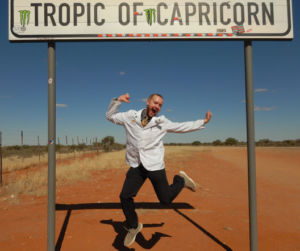
Across Africa on the Atlantic coast, Mason Benjamin is working in Namibia on pharmacy workforce development and hospital pharmacy practice. Benjamin, a College of Pharmacy graduate student, joined a collaborative project between WDI and the International Pharmaceutical Federation Hospital Pharmacy Section. The goal of the project, which includes the University of Namibia School of Pharmacy, is to increase the capacity of hospital pharmacists in Namibia through in-country diagnostics and technical assistance.
Benjamin has been traveling all across the country to visit hospital pharmacies in different regions to develop a landscape analysis of hospital pharmacy practices at both private and public hospitals. Before his site visits began, Benjamin attended the Medication Utilization Review In Africa (MURIA) conference, where he learned about pharmacy practice not only in Namibia but also across Africa.
“I was aware of how different the healthcare system in the United States might be from anywhere else in the world, but always felt that researching other systems online had its limits,” Benjamin wrote in the blog. “I much prefer to learn right from the source and in person, so I was grateful for the opportunity to ask questions to practicing pharmacists from over a dozen different African countries about how things worked in their setting.”
In India, the population of cities is expected to increase by 250 million people in the next 20 years, making employment a crucial need for the new transplants. Ross School of Business MBA student Chris Owen is working with MADE (Michigan Academy for the Development of Entrepreneurs) and its Madurai-based partner Poornatha, which is designing an affordable, world-class coaching curriculum for entrepreneurs in emerging economies. MADE was founded by WDI and U-M’s Zell Lurie Institute.
Owen is identifying best practices of existing coaching programs in India and other emerging economies, conducting a needs assessment of entrepreneurs in Madurai and developing a framework and training curriculum for how coaches will be identified, on-boarded and trained.
“By investing in strong local economies, India can address its dual-challenges of rapid urbanization and rising unemployment,” Owen wrote on the intern blog. “Indeed, for this reason, entrepreneurship in India – and the work of Poornatha – is becoming increasingly important.”
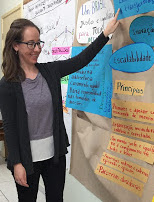 In Brazil, Rebecca Grossman-Kahn – a student at Ross and the U-M Medical School – is developing a tool to assess the social impact of the gender equality programs of Plan International’s Brazil office. Plan International has a long history of advocating for children’s rights but recently decided to focus its work in Brazil on promoting girls’ rights and equality. Gender roles in Brazil tend to be rigid and many girls stop studying in middle or high school to help with housework at home, Grossman-Kahn wrote on the blog. She attended a staff retreat to strategize on how to combat resistance from community members and organizations regarding Plan’s new focus on gender.
In Brazil, Rebecca Grossman-Kahn – a student at Ross and the U-M Medical School – is developing a tool to assess the social impact of the gender equality programs of Plan International’s Brazil office. Plan International has a long history of advocating for children’s rights but recently decided to focus its work in Brazil on promoting girls’ rights and equality. Gender roles in Brazil tend to be rigid and many girls stop studying in middle or high school to help with housework at home, Grossman-Kahn wrote on the blog. She attended a staff retreat to strategize on how to combat resistance from community members and organizations regarding Plan’s new focus on gender.
While at the retreat, a new World Bank report was released that showed girls who complete secondary education can expect to earn twice as much as those with no education.
“Studies like this can help get community leaders on board with Plan’s mission,” Grossman-Kahn wrote.
In Nepal, nearly two out of three working people are farmers. But the country’s rugged topography and lack of infrastructure makes it difficult to farm year-round despite a lengthy monsoon season. Additionally, in rural Nepal, only 5 percent of the population has reliable access to electricity. But the country has more than 300 days of sunshine, making it a perfect candidate for solar-powered agricultural services.
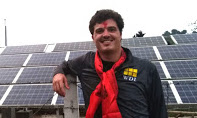 Matthew Carney, a dual degree student at Ross and the U-M School for Environment and Sustainability, spent the summer with the solar startup Ecoprise to help bring solar-powered agricultural services to subsistence farmers in the Terai region of Nepal that borders India. AgroHub, a pay-as-you-go service-based business model recently started by Ecoprise, provides access to solar-powered infrastructure for remote, underserved farming communities. These hubs provide farmers with access to equipment for irrigation, clean drinking water, food-processing and refrigerated post-harvest storage as a service.
Matthew Carney, a dual degree student at Ross and the U-M School for Environment and Sustainability, spent the summer with the solar startup Ecoprise to help bring solar-powered agricultural services to subsistence farmers in the Terai region of Nepal that borders India. AgroHub, a pay-as-you-go service-based business model recently started by Ecoprise, provides access to solar-powered infrastructure for remote, underserved farming communities. These hubs provide farmers with access to equipment for irrigation, clean drinking water, food-processing and refrigerated post-harvest storage as a service.
AgroHub has proved very successful for those farmers who have used it, allowing them to irrigate more land during the winter and monsoon seasons and reducing the use of diesel-powered water pumps that saves money. Carney’s task is to develop a plan to bring the service to farmers in western Nepal.
“Solar-powered agriculture presents an opportunity to raise the living standards of millions of rural Nepali farmers in a sustainable fashion,” he wrote. “It would be a shame to waste it.”
WDI is part of two separate grants awarded by the Reproductive Health Supplies Coalition (RHSC) Innovation Fund, the organization’s flagship initiative to spur and finance promising new ideas and strategies. The coalition, which is the largest network of reproductive health organizations, aims to ensure that a range of quality reproductive health supplies are available equally to all people who need them regardless of income.
Both grants were awarded in March at RHSC’s meeting in Brussels. The first grant was awarded to WDI’s Healthcare Initiative to study and make recommendations to improve commercial distribution of family planning products in remote and underserved populations in low- and middle-income countries (LMICs).

Andrea Bare
The project, “Total Market Approach: Private Sector Distributor Landscape Analysis,” is being funded by the RHSC, a global partnership of public, private and non-governmental organizations dedicated to ensuring that all people in LMICs can access and use affordable, high-quality supplies to improve reproductive health. It will be led by WDI Senior Advisor Andrea Bare and Research Associate Erika Beidelman.
Historically, low-income people living in rural areas have less access to family planning products and services partly due to market distribution barriers. Social marketing organizations (SMOs) play a vital role in improving access to, and choice of, an assortment of family planning products at a variety of prices in underserved markets. SMOs provide product-based contraceptive social marketing programs, which are funded in part by donors, making products and/or services subsidized. As donor support begins to phase out and SMOs pursue transition to greater sustainability with less dependence on subsidies, existing distribution models will be impacted.

Erika Beidelman
Global indicators suggest that the donor resource base for family planning supplies will decrease in the future, widening the existing funding gap. Further complicating the market, demand will continue to grow as countries strive to meet global family planning goals by 2020 – increasing total commodity costs required to meet women’s needs. A RHSC gap analysis showed that in 135 LMICs there will be a $238 million funding gap in 2018 which will grow to $290 million for 2020. For the years 2018-20, the combined funding shortfall is estimated to be $793 million. WDI’s research project will address the urgency of engaging the private sector and commercial distributors as part of the global effort to address the widening funding gap and ensure availability of family planning products.
Bare and Beidelman will take an in-depth look at Malawi as an example country with high donor involvement, strong SMO presence and limited commercial presence. They will then contrast what is occurring in Malawi with countries such as Vietnam, Cambodia, Guatemala or Morocco where donor funds and SMO presence are lower and the commercial distribution sector is more mature. This assessment will map what is currently working and not working for commercial distributors, with insights into their current business and service models, barriers to participation and opportunities for improvement.
By examining Malawi against the other countries, market needs, policy conditions and opportunities can be identified to foster commercial investment and participation within the distribution sector. WDI researchers are then able to develop a set of hypothetical solutions to remedy the challenges and “concept test” them with stakeholders.
The goal is to deliver a final set of potential, recommended solutions for increasing the role of the commercial sector in family planning products distribution to rural and other underserved populations.
WDI has partnered with RHSC on a past project. In 2017, WDI, RHSC and the U.S. Agency for International Development (USAID) collaborated on Market Bookshelf, an easy-to-navigate online platform to facilitate the dissemination and sharing of global health market knowledge. The goal of the platform is to increase returns on donor and other stakeholder-funded research and help advance global health objectives through knowledge-sharing.
In the second project funded by RHSC’s Innovation Fund, WDI will partner with VillageReach on a six-month project to help improve reproductive health supply chains to increase the availability of family planning products.
Many LMIC governments own and directly operate thousands of public health clinics, and spend money to get health commodities out to the clinics. But this becomes a big challenge to reliably get products out there. As a result, governments have paid more attention to more effectively design well-functioning supply chains that align with health policy.
But designing efficient and effective supply chains often requires specialized software and data-intensive analyses, which can be expensive and difficult to manage in LMIC healthcare settings. Additionally, reproductive health commodities are unique because of the need to provide multiple product options to ensure that women are able to choose the products that best suit their specific needs.
WDI developed two different tools to simplify the process of supply chain design by addressing these software and data needs challenges. Both tools use Microsoft Excel, which is widely available, and are designed to operate without requiring intensive data collection.
The first tool uses benchmark and proxy data to help health program managers quickly estimate the cost of operating their supply chain. It can also be used to examine the cost impact of any design changes they are considering, such as delivering products more or less frequently, or integrating family planning product deliveries with other types of products, like HIV malaria medicines.
“The tool allows health program managers to quickly explore these types of supply chain design questions at a high level – questions that would otherwise require a difficult and resource-intensive analysis,” said Michael Krautmann, a senior research associate for the Healthcare Initiative.

Michael Krautmann
The second tool is more strategic in nature, helping health system leaders quickly assess a wide range of factors in their country that affect supply chain performance – geography, politics, financing, human resources – and identify the types of supply chain strategies that are most aligned with that context. Again, WDI helped minimize barriers to using the tool by designing it in Excel and using data that already exists in the global health space. Together these tools allow governments or donor agencies to quickly get answers that aid in improving supply chain design.
WDI and VillageReach have been longtime partners. VillageReach has supported the work of several WDI summer interns, and the Institute’s Healthcare Initiative partnered with the global nonprofit from 2014-16 to enhance vaccine supply chain performance by evaluating mechanisms to improve accountability of vaccine program staff in three provinces in Mozambique.
Also announced at the Brussels meeting was Bare’s election as chairwoman of the RHSC’s Market Development Approaches Working Group (MDAWG). As one of RHSC’s several mechanisms through which coalition members collaborate, MDAWG is focused on the “total market,” striving to facilitate wider private sector involvement and overall market growth. RHSC uses these working groups, along with several caucuses, to bring members and partners together to build sustained, coordinated action toward specific and agreed-upon goals.
Bare’s two-year term involves several duties, including pursuing the objectives of MDAWG to:
Bare will work closely with RHSC secretariat staff to provide leadership for the group’s workstreams and activities, to ensure the visibility of its work both internally and externally and to collaborate with other RHSC working groups.
“I am grateful for this opportunity and excited to work my coalition colleagues in MDAWG,” Bare said. “Through our individual organizations and together as a group, we aim to contribute to the private sector’s development and sustainability in order to increase reproductive health access and supply security.”
Homepage image credit UNFPA Flickr
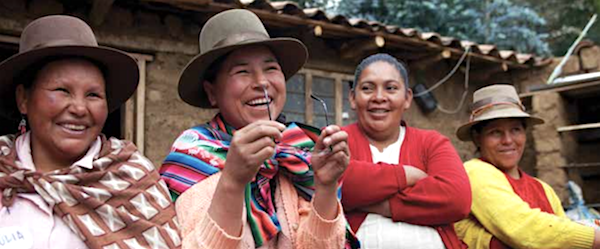
Women working with Chakipi Acceso in Peru. Image courtesy of Chakipi.
Note: The following post was co-written by Rebecca Baylor, Heather Esper and Yaquta Kanchwala Fatehi of WDI’s Performance Measurement Initiative. It was originally published on NextBillion.net, which is managed by WDI.
For many businesses and organizations, the idea of measuring their impacts is usually one of three things: scary, elusive or just plain boring. To make matters worse, evaluators have a rotten reputation for using too much annoying technical jargon. While there is some truth to these stereotypes, it doesn’t have to be all bad.
Our work demonstrates that it is possible to bridge the gap between people and metrics in a meaningful way.
In fact, our team at the William Davidson Institute recently released an impact report that demonstrates how we guided three organizations on how to demystify data collection of their social impacts. We worked with senior level leadership to develop strong surveys and data collection processes suited to their context. Perhaps more importantly, we openly discussed their measurement concerns and made explicit– dare we say, energetic– connections between their impact metrics and organizational strategy.
A key theme throughout this project was our goal to combine social and business metrics. When organizations – from enterprises to impact investors – actually track these types of combinations, which we refer to as “power couples,” they can absorb unique insights to solve key business challenges while communicating impact evidence. Through our work, we have encountered a number of social + business metric power couples that we’ve seen influence internal decision-making at organizations and improve results. Creating these power couples enables managers to more holistically harness their data to better meet business goals and increase intended impacts. For example, employee retention, an all-important business metric, may be affected by the impact that an organization has on the quality of life of their employees’ children, a social metric. This may be especially true for low- or middle-income employees.
Here are just a few common power couples that we identified during this project (detailed in the report) and others.
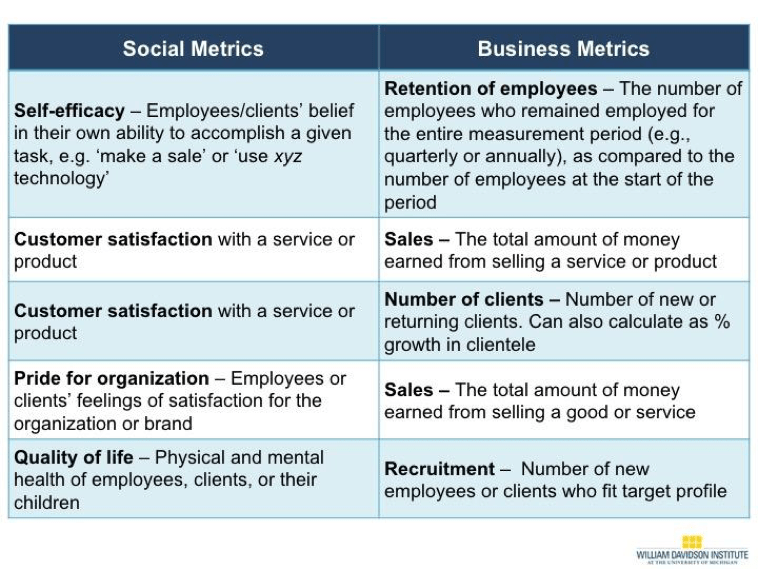
This list is just a start.
Selecting metrics takes time and patience. Indeed, finding the right metrics can be a lot like parenting. There isn’t one perfect formula and your strategy will likely evolve over time. However, we recommend businesses and investors interested in seeing social or environmental impact use some of the following strategies to make their job easier. We’re also including relevant resources to help you apply these strategies:
We hope these combinations excite you and inspire you to create a few social + business metrics of your own. Also, check out our case study for five lessons learned to accelerate successful impact measurement as an investor or investee. And if you enjoyed this post, share it, tweet it, or comment below! We’re also very curious about what social + business metric combinations have or haven’tworked for you. We look forward to hearing from you.
See? Impact measurement isn’t as scary (or as boring) as it may first seem.
Rebecca Baylor is a research associate for the Performance Measurement Initiative.
Heather Esper is the senior program manager for WDI’s Performance Measurement Initiative.
Yaquta Kanchwala Fatehi is a program manager for WDI’s Performance Measurement Initiative.
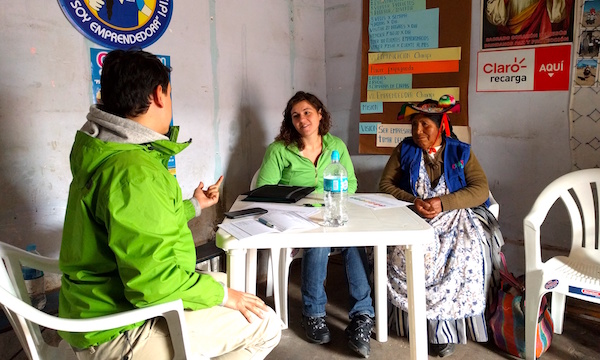
Many organizations working with small businesses in low-income countries struggle with how to separate powerful, but anecdotal, stories from true social impact that can be replicated.
The newly released WDI Impact Report, “Positive Change Through Actionable Metrics,” reviews the work of the Institute’s Performance Measurement Initiative (PMI) while pilot-testing a new framework in Brazil, Nicaragua and Peru designed to increase the impact of small, inclusive businesses and their distribution networks.
The latest report traces WDI’s work back to a 2015 Mexico conference sponsored by the Inter-American Development Bank (IDB) where WDI Senior Program Manager Heather Esper debuted the new framework, which includes a mix of standardized social and business metrics over the short and long term. There was great interest in having WDI pilot the framework with different micro-distribution organizations in IDB’s SCALA network, which brings together anchor companies, microfinance institutions, academia and non-governmental organizations to combine efforts to grow inclusive distribution networks.
Three SCALA network organizations were selected – Supply Hope in Nicaragua, Chakipi Acceso in Peru and Kiteiras in Brazil – and WDI went to work to identify indicators from the framework that would properly reflect the impact on the micro-distributors for each venture. The team also developed context-specific collection plans for gathering the necessary data. This helped the enterprises increase their data collection skills, and allowed WDI to test how much practical guidance future organizations would need if they were using the framework.
 “We are pleased to release this impact report that highlights our work with three great organizations to achieve measurement that is actually meaningful to them,” said WDI Research Associate Rebecca Baylor. “The teams we worked with deserve a lot of credit for the success of this project. So many organizations are struggling with how to measure their impacts, and these teams were willing to have in-depth conversations and reflect on their data collection practices.”
“We are pleased to release this impact report that highlights our work with three great organizations to achieve measurement that is actually meaningful to them,” said WDI Research Associate Rebecca Baylor. “The teams we worked with deserve a lot of credit for the success of this project. So many organizations are struggling with how to measure their impacts, and these teams were willing to have in-depth conversations and reflect on their data collection practices.”
As the report chronicles, WDI developed surveys for the three organizations and helped them collect and analyze the data. The work culminated in a set of recommendations for the three organizations to apply in future impact measurement activities. All three gained a better understanding of how to measure changes in the well-being of their micro-distributors.
“They were committed to building their capacity for making decisions with the data they collect,” Baylor said. “This report shares the process we went through together and will be valuable for other organizations who are striving to accomplish the same.”
It’s the second report in an ongoing series that chronicle the long-term impact WDI is having in certain sectors or geographies. The first WDI Impact Report, “Improving Business Education in the Philippines,” debuted in March 2017. It examined the Institute’s contributions to the five-year STRIDE project that focused on strengthening the science, technology, research and innovation capacity on the island nation.
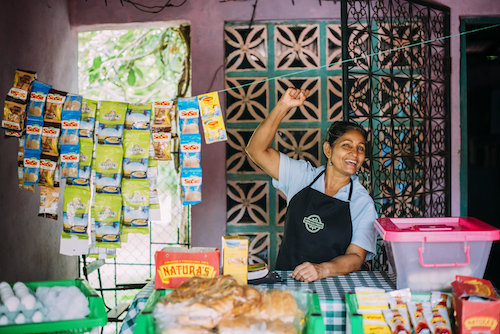
Image credit: Dani Cowan/Supply Hope
A new case study authored by WDI’s Performance Measurement Initiative (PMI) that gives advice to impact investors and investees on new and emerging ways to strengthen their impact measurement practices will be released at two major, international conferences this week.
The case, “Accelerating Measurement within Impact Investing: Five Critical Lessons,” will be shared with attendees at the Latin American Impact Investing Forum (FLII) in Merida, Mexico and the Aspen Network of Development Entrepreneurs (ANDE) “Metrics from the Ground Up” conference in Nairobi, Kenya. It tracks the WDI team as it pilot-tested its new impact measurement framework with three social enterprises in Nicaragua, Brazil and Peru, and provides recommendations to strengthen the impact measurement practices of investors as well as the enterprises they support.
“We are excited to release the case study at these conferences because the five key lessons will be familiar to many in attendance, and may provide useful insights to related measurement challenges they are facing,” said Heather Esper, senior program manager for PMI. “At the FLII event, the attendees will be impact investors or those working with them. The report, which we’re also releasing in Spanish, will be directly relatable to them and provide guidance on how to address key obstacles they encounter when trying to measure the ‘impact’ in impact investing.”
Esper will be joined at the FLII event by Diana Paez, director of WDI’s Grants Management department, to meet with potential partners who are interested in carrying out work similar to the pilot projects featured in the report.
PMI Program Manager Yaquta Kanchwala Fatehi will participate in the ANDE conference, where presenters and the audience will share experiences about different approaches to evaluation, the challenges each approach presents and building bridges between different approaches.
“We will also look to identify potential strategies to address those challenges in the different contexts where participants have done measurement and evaluation,” Fatehi said.
WDI’s case study comes at an opportune time as the call for better impact measurement grows globally. A December 2017 ANDE report found that more than half of the member organizations they surveyed have no full-time staff person dedicated to measurement. Additionally, nearly all respondents spent less than 5 percent of their annual budget on measurement.
Similarly, in a recent report by the Global Impact Investing Network (GIIN) many survey respondents said measurement issues, as opposed to management concerns, were a big challenge. In the GIIN survey, 43 percent of respondents cited significant challenges in collecting quality data, while 32 percent said aggregating, analyzing, and/or interpreting data across a portfolio was a problem for them.
For WDI’s report, the PMI team identified five valuable lessons they learned from working on the three pilots. They are summarized in the table below.
| Recommended activity | Value for Impact Investors and Social Enterprises |
| Use standard indicators, not standard measures | Contextualize data collection to ensure accurate data |
| Use a Theory of Change | Articulate impact, decide what to measure, assign indicators |
| Support M&E capacity building techniques | Speak the same language, conduct M&E without external teams, maintain sustainable M&E practices |
| Mix social outcomes with key business performance indicators | Strengthen mission and ability to scale |
| Foster a senior-level staff as a M&E champion | Help facilitate embedding of data collection into existing business processes |
Rebecca Baylor, a PMI research associate, said the recent reports highlighted the need for businesses and impact investors to reconsider and re-energize how to incorporate measurement into their own practices.
“Our team is excited to engage in that conversation by sharing experiences from our own work,” she said. “Our case study not only speaks to the struggles of individual businesses but also generalizes findings about how to incorporate measurement at scale across multiple similar enterprises.”
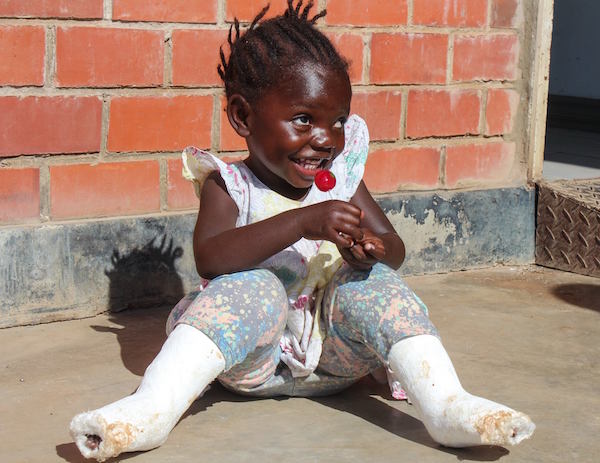
A child recovers from clubfoot treatment. Image courtesy of CURE International.
The head of WDI’s Healthcare Initiative recently spent a week in Ethiopia identifying and offering remedies for current challenges faced by the nonprofit charitable organization CURE International and its clubfoot program in that country.
CURE operates clubfoot clinics in 17 countries around the world, each tasked with helping children and families deal with the congenital deformity that twists the foot, making it difficult or impossible to walk. In Ethiopia, CURE manages 37 clinics.
Pascale Leroueil, director of the Healthcare Initiative, traveled to Ethiopia for the project, the first time the initiative has worked in the country. WDI has organized student MBA student teams from the University of Michigan’s Ross School of Business to work with CURE in the past, but in India.
“Cure officials in Ethiopia want to grow their coverage in the next two to five years to cover the entire country with clubfoot care, which is an ambitious goal,” Leroueil said. “So they were looking for some advice and our thoughts on their current challenges.”
Leroueil highlighted three areas of concern, beginning with how the nonprofit’s management reporting structure was organized and who reported to whom. Another focus was ensuring the physiotherapists and surgeons who perform clubfoot procedures are properly trained and remain up-to-date on the latest methods.
The final area highlighted by Leroueil that required attention was CURE’s ability to manufacture foot abduction braces at the scale and quality needed to treat the children with clubfoot.
To treat a child with clubfoot, ideally in the first three months of the child’s life, their affected foot is manipulated and placed in plaster casts for six to eight weeks. Often, the child’s Achilles tendon needs to be severed – an outpatient surgery done under local anesthesia. The foot is then placed in a cast again for about three weeks while the tendon grows back. After that, the feet should be in the correct position. The child will wear foot abduction braces for a few years to maintain the correct positioning of the feet.
Leroueil said a student team comprised of Ross School graduate students will soon tackle the challenge of identifying what is needed at the supply chain and brace manufacturing level for the nonprofit to scale up its coverage countrywide.
Leroueil said she gave CURE managers advice on how to address the other two issues she highlighted, and the nonprofit is deciding how best to resolve them. Leroueil said WDI is ready to assist CURE in the future.
“My hope is that our relationship with CURE will continue to grow, both in terms of student and staff projects,” she said.